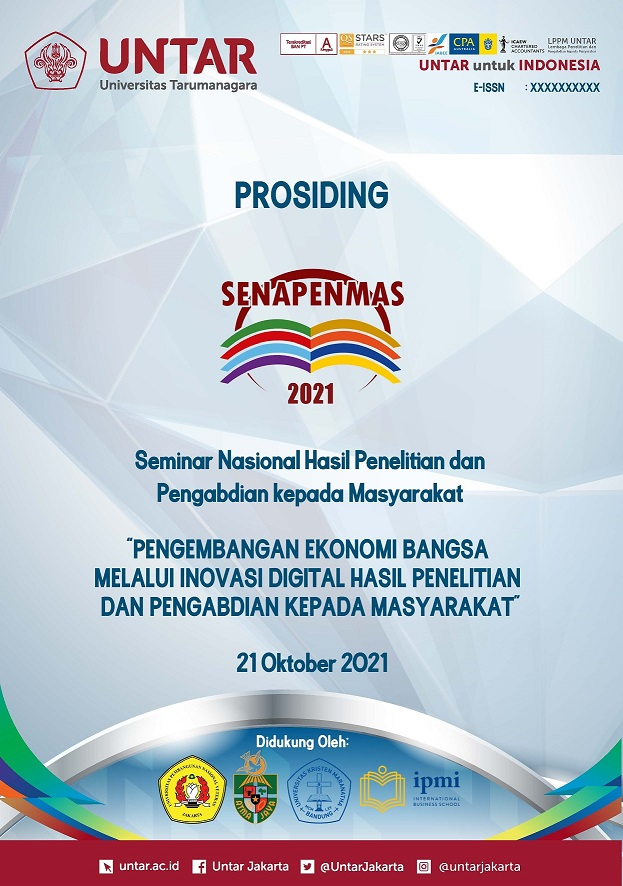DAMPAK UNIVERSITY ENVIRONMENT AND SUPPORT PADA ENTREPRENEURIAL INTENTION (STUDY KASUS: MAHASISWA SEMESTER TIGA)
Main Article Content
Abstract
This study was conducted with the aim of knowing the entrepreneurial intention of students who are directly influenced by the environment and university support and to find out the entrepreneurial intention indirectly through mediating attitudes towards behavior and self-efficacy. The sample used in the study was 80 respondents using purposive sampling technique. The respondents of this research are students who are studying in the third semester from one of the universities in East Java. The data collection process was carried out online to all respondents using the google form. The collected data was then analyzed using path analysis with the SPSS application. The results of this study indicate: 1) the environment and university support provided do not have a direct effect on the entrepreneurship intentions of third semester students, 2) Attitudes towards behavior mediate environmental influences and university support for entrepreneurship intentions of third semester students, 3) Self-efficacy mediates the influence between the environment and the environment. university support for the entrepreneurship intentions of third semester students. The contribution of this research is to provide practical input to the University to increase the entrepreneurial intention of students from the third semester until graduation.
Penelitian ini dilakukan dengan tujan untuk mengetahui entrepreneurial intention mahasiswa yang dipengaruhi secara langsung oleh lingkungan dan dukungan universitas dan mengetahui intensi berwirausaha secara tidak langsung melalui mediasi sikap terhadap perilaku dan efikasi diri. Sampel yang digunakan pada penelitian sebanyak 80 responden dengan menggunakan teknik purposive sampling. Responden penelitian ini merupakan mahasiswa yang menempuh pendidikan pada semester tiga dari salah satu Universitas di Jawa Timur. Proses pengumpulan data dilakukan secara online kepada seluruh rsponden dengan menggunakan google form. Data yang terkumpul selanjutnya dianalisis menggunakan analisis jalur dengan aplikasi SPSS. Hasil penelitian ini menunjukkan: 1) lingkungan dan dukungan universitas yang diberikan tidak berpengaruh langsung pada intensi berwirausaha mahasiswa semester tiga, 2) Sikap terhadap perilaku memediasi pengaruh lingkungan dan dukungan universitas terhadap intensi berwirausaha mahasiswa semester tiga, 3) Efikasi diri memediasi pengaruh antara lingkungan dan dukungan universitas terhadap intensi berwirausaha mahasiswa semester tiga. Kontribusi penelitian ini memberikan masukan praktisa kepada Universitas untuk meningkatkan entrepreneurial intention mahasiswa sejak semester tiga hingga lulus.
Article Details
Section
References
Ajzen, I. (1991). The Theory of Planned Behavior Organizational Behavior and Human Decision Processes. Organizational Behavior and Human Decision Processes, 50(2), 179–211.
Br Sitepu, S. N. (2017). Pendekatan Entrepreneurial Individual untuk Menciptakan Behaviours Entrepreneurship Studi Kasus Mahasiswa Universitas Ciputra Surabaya.
Flammer, A. (2015). Self-Efficacy. International Encyclopedia of the Social & Behavioral Sciences: Second Edition, 4(1994), 504–508. https://doi.org/10.1016/B978-0-08-097086-8.25033-2
Laguía González, A., Jaén, I., Topa, G., & Moriano, J. (2019). University environment and entrepreneurial intention: the mediating role of the components of the theory of planned behaviour / El entorno universitario y la intención emprendedora: el papel mediador de los componentes de la teoría de la acción planificad. Revista de Psicologia Social, 34(1), 137–167. https://doi.org/10.1080/02134748.2018.1542789
Li, C. (2020). Self-efficacy theory. Routledge Handbook of Adapted Physical Education, 313–325. https://doi.org/10.4324/9780429052675-24
Moraes, G. H. S. M. de, Iizuka, E. S., & Pedro, M. (2018). Effects of Entrepreneurial Characteristics and University Environment on Entrepreneurial Intention. Revista de Administração Contemporânea, 22(2), 226–248. https://doi.org/10.1590/1982-7849rac2018170133
Nowi?ski, W., Haddoud, M. Y., Lan?ari?, D., Egerová, D., & Czeglédi, C. (2019). The impact of entrepreneurship education, entrepreneurial self-efficacy and gender on entrepreneurial intentions of university students in the Visegrad countries. Studies in Higher Education, 44(2), 361–379. https://doi.org/10.1080/03075079.2017.1365359
Sarwono, J. (2014). Path analysis dengan SPSS. Elex Media Komputindo.
Soria-Barreto, K., Honores-Marin, G., Gutiérrez-Zepeda, P., & Gutiérrez-Rodríguez, J. (2017). Prior exposure and educational environment towards entrepreneurial intention. Journal of Technology Management and Innovation, 12(2), 45–58. https://doi.org/10.4067/S0718-27242017000200006
Sujarweni, V. W., & Utami, L. R. (2019). The Master Book of SPSS. Anak Hebat Indonesia.
Surya, J. E., Nathasya, S., & Sitepu, B. (2019). Pengaruh University Environment And Support Terhadap Entrepreneurial Intention Generasi Milenial Mengembangkan UMKM. 1(20), 19–27.
Thohir, M. (2013). Metodologi Penelitian Sosial Budaya (2nd ed.). Bumi Aksara. https://difarepositories.uin-suka.ac.id/152/1/metodologi penelitian sosial.pdf
Trivedi, R. (2016). Does university play significant role in shaping entrepreneurial intention? A cross-country comparative analysis. In Journal of Small Business and Enterprise Development (Vol. 23, Issue 3). https://doi.org/10.1108/JSBED-10-2015-0149

